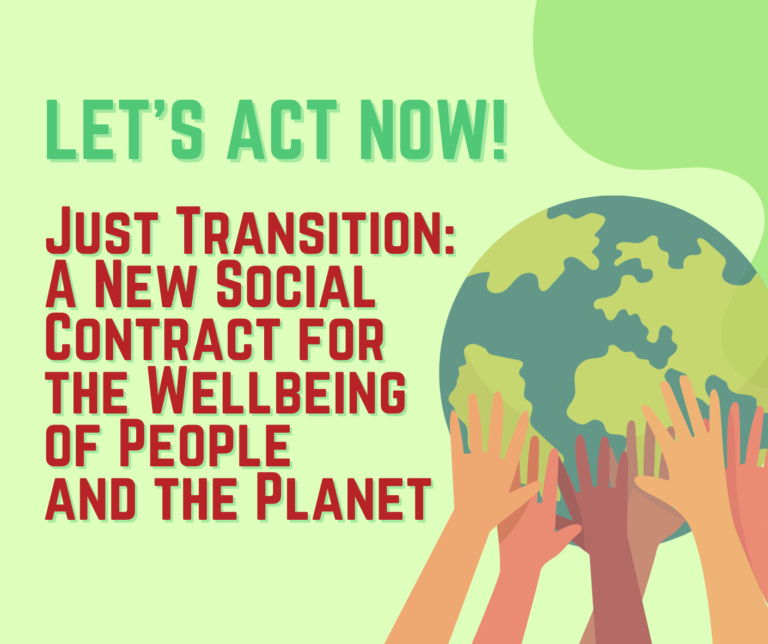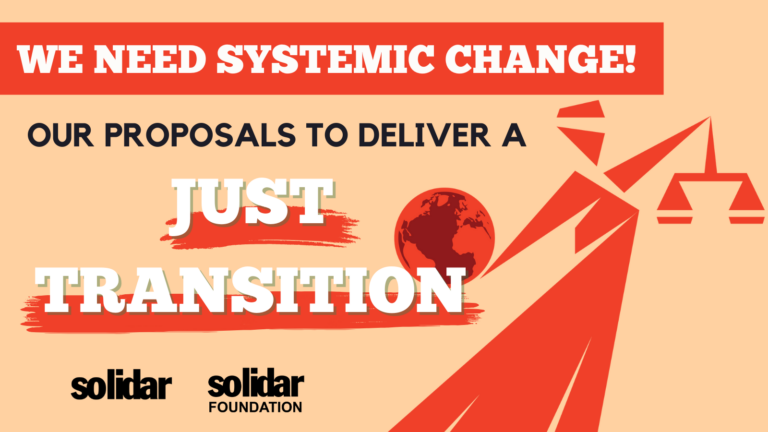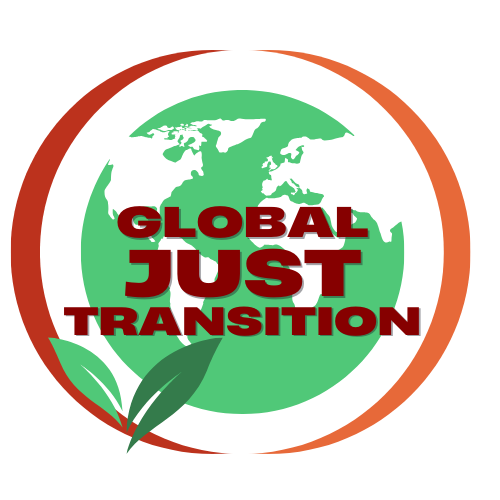Time for EU Leaders to Choose a Just Energy Transition and a Stronger Social Europe
May 30, 2022
SOLIDAR and FEPS call on leaders in Europe to put in place transformative action aimed at making our societies and economies peaceful, equitable and climate-neutral, starting with ensuring a rapid and just energy transition and building a stronger social Europe.
We live in times of recurrent and mutually reinforcing global crises. The Russian Federation’s brutal invasion of Ukraine is costing thousands of lives, leaving cities and regions in ruins and putting pressure on food and energy supplies. It has put an end to the European security order and will define international relations for decades to come. Simultaneously, the climate and environmental emergency, the Covid-19 pandemic, high inflation and growing socioeconomic inequalities both cause and aggravate one another. In response to these crises, governments tend to be more short-sighted than strategic, leading to underfinanced social protection systems and inadequate policies such as the lack of effective taxation of wealth or comprehensive foresight on the effects of privatization. As a result, we continue to speed down an unsustainable path that is profoundly unsuitable to face up to the crises of our times.
However, we are not helplessly doomed to tumble from one emergency to the next. In these difficult times, we have a historic opportunity to tackle all crises simultaneously and effectively by putting in place deep and transformative action aimed at making our societies and economies peaceful, equitable, climate-neutral and respectful of the environment. This transformation requires moving towards a wellbeing economy for both people and the planet, profoundly re-organizing our production capacity and our distribution, and reversing the process of neoliberal privatisations. Moreover, it must be unlike anything we have done before, both in terms of scope and pace: science tells us that we have less than 10 years to avoid catastrophic climate change.
SOLIDAR and the Foundation of European Progressive Studies (FEPS) call on all leaders in Europe to set this transformation in motion, starting with ensuring a rapid and just energy transition and building a stronger social Europe.
Accelerating a Just Energy Transition
Russia’s invasion of Ukraine has shed light on Europe’s dependence on oil and gas from authoritarian regimes and sparked heated debates on adjusting the EU’s and national energy strategies to the new geopolitical situation. Now, leaders in Europe must ensure our sustainability, resilience and independence by firmly committing to a rapid, full, and socially just energy transition.
The ongoing crises cannot lead to new investments in fossil fuel energy production, so the current increase in use of fossil fuels must be short-term and conditioned. We call on decisionmakers to commit to 100% sustainable renewable energy sources at the latest by 2040. Increasing the ambition of the timeline is crucial to take global fairness and the different capacities to implement transformative climate policies into account. Moreover, governments should spare no efforts to reduce energy consumption by industry, the public sector and private households, fight greenwashing, tackle energy poverty, support clean energy communities and empower citizens to undertake energy and fuel savings.
Accelerating the green transition, however, cannot be an excuse for taking decisions in an undemocratic way. We must strengthen civil and social dialogue, so that when swift and bold action is necessary, civil society, trade unions and other affected stakeholders can promptly take part in decision-making. Moreover, we must reconsider the reflex to cut red tape on environmental and social aspects in times of crises. Legal provisions protecting environmentally harmful production and concentration of ownership in systems like energy should be removed, whereas policies and technologies that empower community ownership and democratic control should be strengthened.
While some have taken advantage of the crisis to attack the European Green Deal (EGD) and advocate for slowing down the green transition, SOLIDAR and FEPS strongly believe that now is the time to make the EGD bolder, more ambitious, and socially fair. The EU should play a central role in tackling energy poverty by committing to a permanent Social Climate Fund with an ample budget. The Fund must drive a socially just process of decarbonization in the long term and increase the resilience of citizens in times of crises and rapid transformations. Most of the financial envelope should, therefore, be used for measures such as deep house renovation projects, sustainable mobility infrastructures, setting up renewable installations or other structural energy efficiency and sufficiency improvements.
Lastly, Europe should break its energy dependence on other countries by putting the production of energy back in the hands of local and regional communities across the continent. A more localised energy production system would not only lead to energy autonomy, but also support community development, offer employment opportunities and occasions of citizen participation and ownership, and potentially help mitigate conflicts between countries. The supply chains necessary for this drastic change must be defined by true partnerships, based on mutual cooperation and respect, with suppliers, in order to avoid new dependencies that risk supporting new and old autocratic regimes and oligarchs.
Strengthening a Social Europe
Europe needs a new social contract, where social and environmental sustainability go hand in hand and characterized by social cohesion, enhanced access to rights, reinforced social protection and equality. To achieve these objectives, we must strengthen the European social model as an integral part of the green transition and build resilient and well-functioning welfare systems with guidance from the 20 principles of the European Pillar of Social Rights.
We call on EU leaders to seize the precious momentum offered by the EU Economic Governance Review process to finally re-design the European Semester as a mechanism for truly social and economic policy coordination and an appropriate instrument for long-term social and green public investments. To this end, we advocate for social goals to play a stronger role in fiscal and budgetary procedures and for increased support for a socially Just Transition to climate neutrality.
A strong society, with well-financed and resourced public support systems, equipped and institutionalized mechanisms for social dialogue and the involvement of a strong local civil society in all its diversity, is necessary to increase resilience in the face of global systemic shocks stemming from climate change, the pandemic or war in Ukraine.





